【一轮收尾,二轮起航】2014届高三英语名师语法专练课件:情态动词和虚拟语气(考情前瞻+热点探究+真题变式+高效演练+名师技能策略,均为2013年高考题及模拟题,89ppt)
文档属性
| 名称 | 【一轮收尾,二轮起航】2014届高三英语名师语法专练课件:情态动词和虚拟语气(考情前瞻+热点探究+真题变式+高效演练+名师技能策略,均为2013年高考题及模拟题,89ppt) |  | |
| 格式 | zip | ||
| 文件大小 | 623.9KB | ||
| 资源类型 | 教案 | ||
| 版本资源 | |||
| 科目 | 英语 | ||
| 更新时间 | 2014-01-18 12:52:17 | ||
图片预览

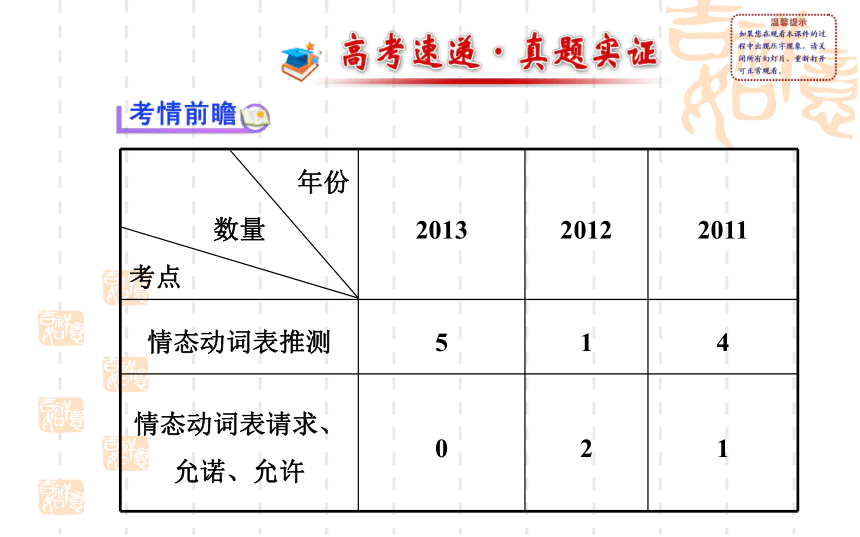
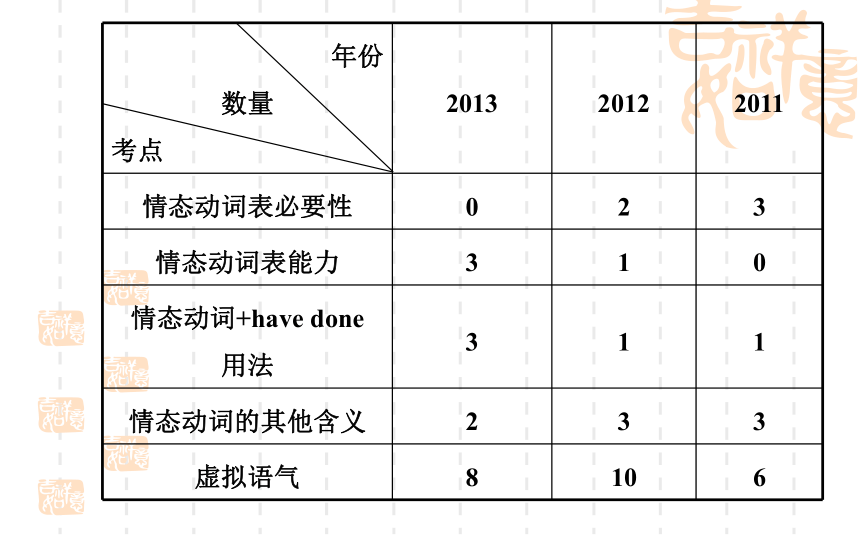
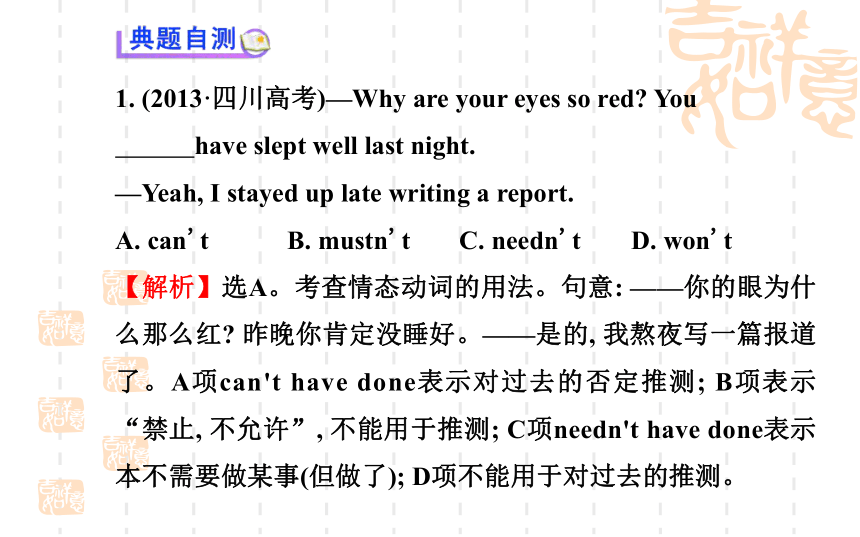
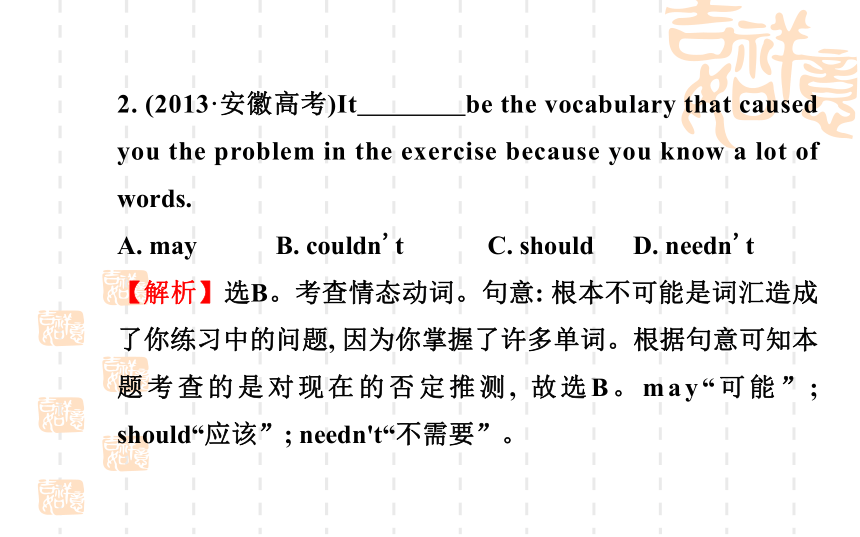
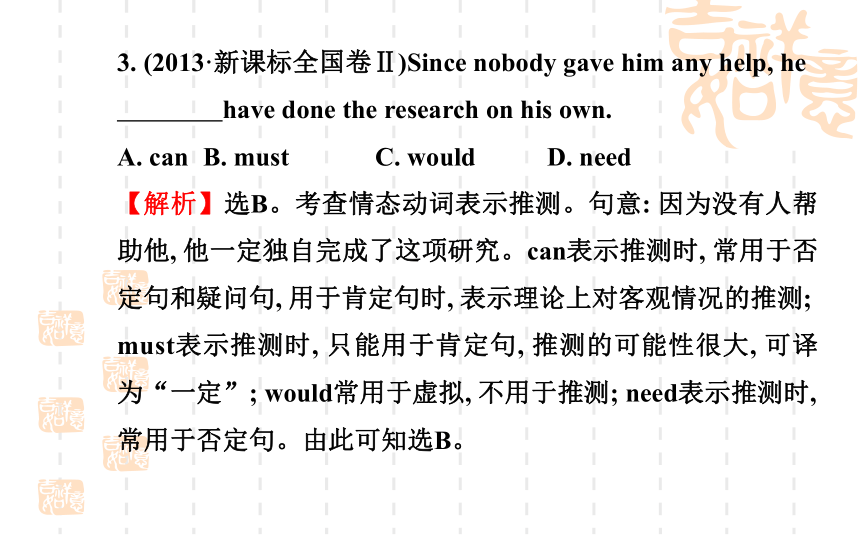


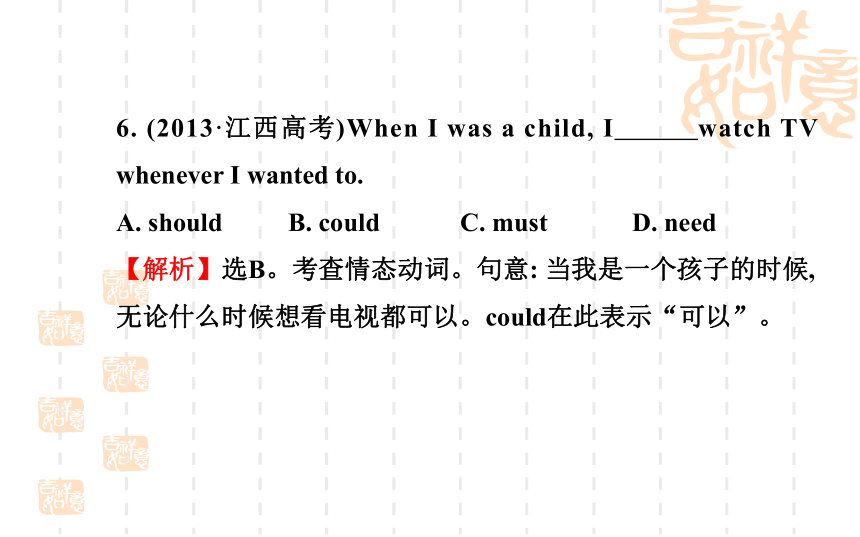
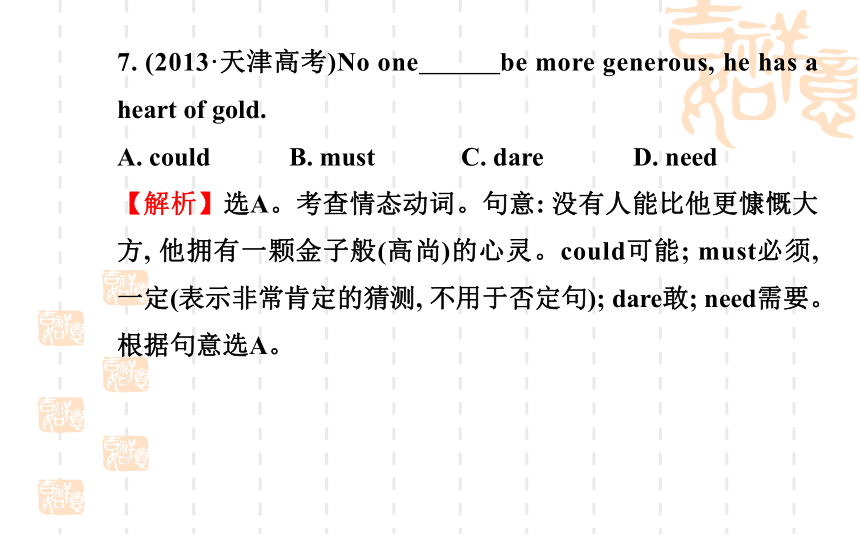

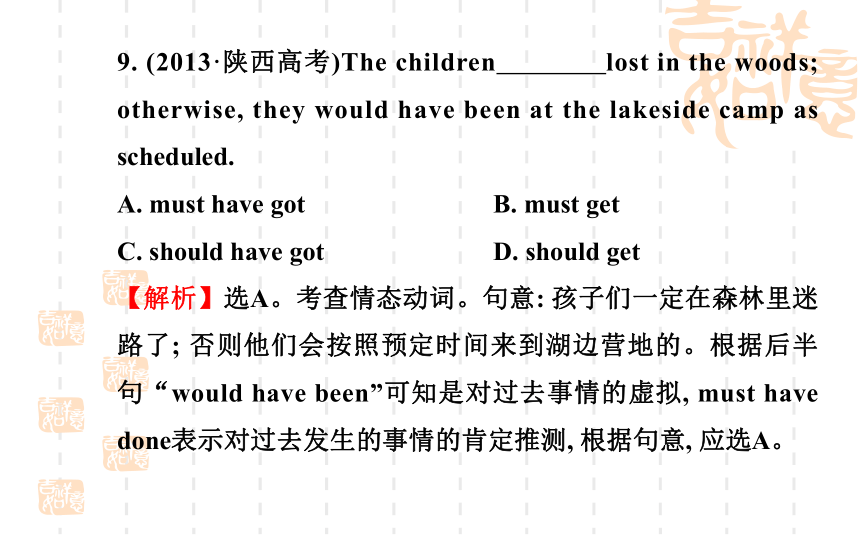
文档简介
课件89张PPT。 情态动词和虚拟语气1. (2013·四川高考)—Why are your eyes so red? You
have slept well last night.
—Yeah, I stayed up late writing a report.
A. can't B. mustn't C. needn't D. won't
【解析】选A。考查情态动词的用法。句意: ——你的眼为什么那么红? 昨晚你肯定没睡好。——是的, 我熬夜写一篇报道了。A项can't have done表示对过去的否定推测; B项表示“禁止, 不允许”, 不能用于推测; C项needn't have done表示本不需要做某事(但做了); D项不能用于对过去的推测。2. (2013·安徽高考)It be the vocabulary that caused you the problem in the exercise because you know a lot of words.
A. may B. couldn't C. should D. needn't
【解析】选B。考查情态动词。句意: 根本不可能是词汇造成了你练习中的问题, 因为你掌握了许多单词。根据句意可知本题考查的是对现在的否定推测, 故选B。may“可能”; should“应该”; needn't“不需要”。3. (2013·新课标全国卷Ⅱ)Since nobody gave him any help, he
have done the research on his own.
A. can B. must C. would D. need
【解析】选B。考查情态动词表示推测。句意: 因为没有人帮助他, 他一定独自完成了这项研究。can表示推测时, 常用于否定句和疑问句, 用于肯定句时, 表示理论上对客观情况的推测; must表示推测时, 只能用于肯定句, 推测的可能性很大, 可译为“一定”; would常用于虚拟, 不用于推测; need表示推测时, 常用于否定句。由此可知选B。4. (2013·重庆高考)—What are you doing this Saturday?
—I'm not sure, but I go to the Rolling Stones concert.
A. must B. would C. should D. might
【解析】选D。考查情态动词。句意: ——你这个周六要干什么? ——不太确定。我可能去滚石乐队的音乐会。由“不太确定”可以判断应该选择可能性不是很大的情态动词might, 故选D; A项表示“必定, 必然”; B项为“will”的过去式, 往往表示意愿或请求; C项表示“应该”。5. (2013·湖南高考)He sleep, although he tried to, when he got on such a hunt for an idea until he had caught it.
A. wouldn't B. shouldn't C. couldn't D. mustn't
【解析】选C。考查情态动词。句意: 当他正寻找一个主意的时候, 尽管他试图入睡, 但是他就是无法睡着, 直到把主意想出来。could表能力, 意为“能够, 可以”, couldn't是其否定形式。6. (2013·江西高考)When I was a child, I watch TV whenever I wanted to.
A. should B. could C. must D. need
【解析】选B。考查情态动词。句意: 当我是一个孩子的时候, 无论什么时候想看电视都可以。could在此表示“可以”。7. (2013·天津高考)No one be more generous, he has a heart of gold.
A. could B. must C. dare D. need
【解析】选A。考查情态动词。句意: 没有人能比他更慷慨大方, 他拥有一颗金子般(高尚)的心灵。could可能; must必须, 一定(表示非常肯定的猜测, 不用于否定句); dare敢; need需要。根据句意选A。8. (2013·辽宁高考)Harry is feeling uncomfortable. He
too much at the party last night.
A. could drink B. should drink
C. would have drunk D. must have drunk
【解析】选D。考查情态动词的用法。句意: Harry感到不舒服。他一定是在昨晚的聚会上喝了太多的酒。根据句意是对发生在过去的情况的推测, 用must have done。9. (2013·陕西高考)The children lost in the woods; otherwise, they would have been at the lakeside camp as scheduled.
A. must have got B. must get
C. should have got D. should get
【解析】选A。考查情态动词。句意: 孩子们一定在森林里迷路了; 否则他们会按照预定时间来到湖边营地的。根据后半句“would have been”可知是对过去事情的虚拟, must have done表示对过去发生的事情的肯定推测, 根据句意, 应选A。10. (2013·新课标全国卷Ⅰ)The door open, no matter how hard she pushed.
A. shouldn't B. couldn't
C. wouldn't D. mightn't
【解析】选C。考查情态动词。句意: 不管她怎么用力推, 门总是打不开。shouldn't不应该; couldn't主观的不能; wouldn't不肯, 不可能, 总是不; mightn't可能不。11. (2013·北京高考)If we a table earlier, we wouldn't be standing here in a queue.
A. have booked B. booked
C. book D. had booked
【解析】选D。考查虚拟语气。句意: 如果我们早些预订餐桌, 现在就不会站在这里排队了。此题为混合虚拟条件句, 主句是与现在事实相反, 从句与过去事实相反, 故从句使用过去完成时。12. (2013·福建高考)—Do you think George has passed the driving test?
—No. If so, he his car to our college yesterday.
A. would drive B. drove
C. would have driven D. had driven
【解析】选C。考查虚拟语气。句意: ——你认为乔治已经通过驾照考试了吗? ——没有。如果通过了, 昨天他就已经开车去我们大学了。由yesterday可知本句是与过去事实相反的假设, 所填处是主句的谓语动词, 故用would have done的形式, 因此选C。13. (2011·安徽高考)I to my cousin's birthday party last night, but I was not available.
A. went B. had gone
C. would go D. would have gone
【解析】选D。考查虚拟语气。句意: 昨晚我应该去堂兄的生日晚会, 但是我没有空。根据句中last night及but可知本题表示的是与过去事实相反的假设, 故选D。14. (2013·浙江高考)Eye doctors recommend that a child's first eye exam at the age of six months old.
A. was B. be C. were D. is
【解析】选B。考查虚拟语气。句意: 眼科医生建议, 孩子的第一次眼睛检查应该在6个月大时进行。recommend建议, 其宾语从句中用should do表虚拟语气, 且should可以省略。故选B。热点考向 1 情态动词表示推测?
1. 主要考点:
(1)表示推测的词义的用法
①must常用于肯定句, 一般不用于否定句和疑问句; can常用于否定句、疑问句或感叹句中, 表示疑惑、惊讶或不相信等意思。could既可用于肯定句又可用于否定句和疑问句中;
②could, should, might不一定与过去时间有关, 而是表示可能性弱于与其相应的现在时形式;
③should/ought to表示推测时, 表示确定或可能性大的合乎理想的情况或结果。(2)表示推测的程度比较2. 突破技巧:
(1)体会语境, 把握说话者的语气, 通过说话者语气推测强弱;
(2)把握句式, 选取合适的表示推测的情态动词。【真题变式】用适当的情态动词填空。
(2012·四川高考)I got close enough to hear them speaking
Chinese, and I said“Ni Hao”just as I______do in China.
我离他们足够近, 能听到他们在讲中文, 就像在中国我也许会
做的那样, 我说了一句“你好”。might热点考向 2 情态动词表示请求、允诺、允许?
1. 主要考点:
(1)can表示允许或许可(口语中常用)
—Could I use your bike tomorrow?
——明天我可以用一下你的自行车吗?
—Yes, you can. (No, I'm afraid not. )
——是的, 你可以。(不, 恐怕不行。)(2)will/would表示请求、建议, 用在问句中时would比较委婉
Will you close the window?
请你把窗户关上好吗?
Won't you drink some more coffee?
要不要再来一点咖啡? (3)shall用于征求对方意见、许诺、命令、警告、威胁等
①shall用于第一、三人称的疑问句中时表示征求意见。
Shall I get you some tea? 我给你倒点茶好吗?
Shall the boy wait outside? 让那男孩在外面等好吗? ②shall用于第二、三人称的陈述句时, 往往表示给对方(you)或第三者(he, she, they)以允诺、命令、决心、警告或威胁等, 在法律、条约、协定等文件中可以表示义务、规定等。
You shall get a birthday present.
你会得到一份生日礼物的。(允诺)
You shall be sorry for it one day, I tell you.
我告诉你, 有一天你会为此后悔的。(警告)
Each citizen shall carry his identification card when travelling.
旅游时每个市民务必带上身份证。(规定)2. 突破技巧:
(1)通过句式把握请求语气;
(2)通过人称、语境辨别允许、许诺、威胁、命令、警告等语气。【真题变式】翻译句子。
(2012·辽宁高考)One of our rules is that every student shall
wear school uniform while at school.
_______________________________________________我们的规定之一就是每个学生在校期间必须穿校服。热点考向 3 情态动词表示必要性?
1. 考查内容:
(1)must必须, 应该(表主观要求)
①mustn't表示“禁止”
②当must用于疑问句时, 其否定回答是No, . . . needn't/don't have to. (2)should/ought to表示“应当, 应该(表义务、责任)”
ought to与should意思大体相同, 但ought to语气比should重, 往往表示从法律或道义上“应该”。
You are his father and ought to take care of him.
你是他父亲, 应当照顾他。(有责任, 从道义上应该)
Young people should show respect to the old.
年轻人应该尊重老年人。(3)have to表示“只好, 不得不(客观的必须, 有时态及人称变化)”
have to表示“必须, 不得不”, 这个意义与must很接近, 但must表示主观意志, 而have to表示由于客观因素不得不做某事。
I told her that she must give up smoking.
我叫她必须戒烟。
I have to hand in my term paper before 5: 00 p. m. today.
我必须在今天下午5点前交学期论文。2. 突破技巧:
(1)把握说话者口气, 根据语境品味“必须; 必要; 一定”含义;
(2)理清应该、有责任、有义务做某事;
(3)注意客观、主观的“不得不”的区别。【真题变式】翻译句子。
(2012·重庆高考)—Must you interrupt now? Can't you see I'm
on the phone?
—Sorry Sir, but it's urgent.
——_________________________________________________
______
——对不起先生, 但是事情很急。你一定要/必须此时打扰我吗? 难道你没有看到我在打电话吗?热点考向 4 情态动词表示能力?
1. 考查内容: can/could与be able to辨析
(1)时态区别
情态动词can只有两种时态形式, 现在式can和过去式could, 而be able to有多种时态形式。
Mary can play the piano. She has been able to play it since she was five.
玛丽会弹钢琴, 她5岁起就会弹了。(2)语境结果区别
could可以表示过去的能力, was/were able to表示经过一番努力后取得了成功, 相当于manage to do或succeed in doing, 而could没有这个含义。
Yesterday I was able to get home before the heavy rain.
昨天我在下大雨前赶到了家里。2. 突破方法:
(1)通过时态把握各自用法;
(2)通过语境辨析自身能力与努力取得。【真题变式】用适当的情态动词填空。
(2012·新课标全国卷Ⅱ)I'm going to Europe on vacation
together with John if I____find the money. can热点考向 5 情态动词+have done用法?
1. 命题角度:
(1)表示“后怕、责备或遗憾”。(2)表示“对过去事实的推断”。2. 突破方法:
(1)通过句意把握“原本……; 现在……”;
(2)通过语境把握“对过去情况的猜测”。【真题变式】翻译句子。
(2012·江苏高考)—Happy birthday!
—Thank you! It's the best present I could have wished for.
——生日快乐!
——谢谢! _________________________________这是我原本希望能得到的最好礼物。热点考向 6 情态动词的其他含义?
1. 考查内容:
(1)情态动词need和dare的用法
①need和dare作情态动词时常用于否定句、疑问句或条件句中, 无人称和数的变化, 疑问句和否定句中不加助动词。
Need I telephone him now? 需要我现在打电话给他吗?
She dare not go out alone at night.
她晚上不敢一个人出去。②need和dare用作实义动词时, 有词形变化, 变成否定句、疑问句时, 要加助动词。
You don't need to do it yourself. 你不必亲自做这件事。
We should dare to give our own opinion.
我们要敢于提出自己的观点。(2)几个表示某一特定的语气或态度的情态动词
①can可以用来表示惊异、怀疑、不相信的态度, 主要用于否定句、疑问句或感叹句中。
How can you be so careless? 你怎么这么粗心?
②must用于条件句或疑问句中, 可以用来表示责备、抱怨的感彩, 意为“偏要、硬要”。
Why must you be so late? 你为何非要这么晚呢? ③may表示愿望、祝福时, 有“但愿, 祝……”之意。
May you succeed! 祝你成功!
④should表示惊讶、不以为然等情绪, 用于某些句型中, 多译为“竟然”。
It seems unfair that this should happen to me.
这种事情竟然发生在我的身上, 好像不公平。⑤will的用法
will表示“意愿、意志”, would表示过去时间的“意愿、意志”。will还可以表示某种倾向或习惯性动作, 意为“总会, 老是”, 其否定结构意为“不肯, 不能”。
I will do anything for you. 我愿意为你做任何事。
The door won't open. 这门打不开。
Every time she was in trouble, she would turn to him for help. 每次遇到麻烦她都会向他求助。(3)情态动词的一些习惯用法
①cannot/can never. . . too或cannot. . . enough表示“无论怎么……也不过分; 越……越好”。
You cannot be too careful. 你越细心越好。
②cannot help doing. . . /cannot help but do. . . /cannot but do. . . 表示“禁不住; 不得不”。
I couldn't help jumping up when I saw him.
一看到他, 我情不自禁地跳了起来。
I cannot but admire his bravery. 我不得不佩服他的勇敢。③“may/might as well+动词原形”表示“还不如, 不妨”, 相当于had better。
It is very late, so you may/might as well go to bed.
夜深了, 不妨去睡吧。2. 突破方法:
(1)掌握固定句式, 相应考题使用句式突破;
(2)把握情态动词的特殊用法, 通过语境、句意选取合适的情态动词。【真题变式】用恰当的情态动词填空。
(2012·天津高考)It's quite warm here; we_______turn the
heating on yet. needn't【命题小试】
请根据以下对话内容命制一道考查情态动词的题目。
I can't thank you too much for all your help to my son while
we were away from home. 【参考答案】I thank you too much for all your help to
my son while we were
away from home.
A. mustn't B. can't C. won't D. shan't
【解析】选B。根据常识对他人帮助的感谢, 意思应该为“再怎么感谢也不为过”, can't. . . too much有此意。热点考向 7 虚拟语气?
1. 考查内容:
(1)条件句中的虚拟语气(2)从句中的虚拟语气(3)特殊句式中的虚拟语气2. 突破技巧:
(1)品味从句中的语气, 把握虚拟句子的特点;
(2)掌握特殊句式, 运用恰当句式的适当动词形式来突破。【真题变式】用动词的适当形式完成下面句子。
(2012·辽宁高考)Jack is a great talker. It's high time that
he _______________(do)something instead of just talking. should do 或 did易错点 1 混淆情态动词的基本用法?
(母题)Days later, my brother called to say he was all right, but
say where he was.
A. mustn't B. shouldn't
C. wouldn't D. mightn't
【解析】选C。句意: 数天后, 我弟弟打电话来说他一切都好, 但是不愿意说他在哪里。mustn't意思为“禁止; 不允许”; shouldn't意思为“不应该”; wouldn't意思为“不情愿”; mightn't意思为“或许不”, 根据句意“不愿意”可知答案C合适。(变式)Days later, my brother called to say he wanted to go home, but mother said he do this because the exam was drawing near.
A. mustn't B. shouldn't
C. wouldn't D. mightn't
【解析】选A。句意: 数天后, 我弟弟打电话来说他想回家, 但妈妈说他不可以这样, 因为考试快到了。【误区点拨】从语境、句意着手, 结合对情态动词的推测、请求、允诺、允许、能力、必要性等基本用法的准确掌握来把握。易错点 2 误用情态动词+have done结构?
(母题)We have bought so much food now that Suzie won't be with us for dinner.
A. may not B. needn't C. can't D. mustn't
【解析】选B。句意: 既然Suzie不与我们共进晚餐, 我们本不需要买这么多的食物。根据语境“不共进晚餐”推知“不需要买这么多的食物”, 故needn't have done意思为“本不需要做……”符合题意。(变式)Suzie have bought so much food now that she recently wants to lose weight.
A. may not B. needn't C. can't D. mustn't
【解析】选C。句意: 既然Suzie近期想减肥, 她不可能买这么多食物。根据生活常识“减肥”则“购买食物不会太多”, 故用can't have done形式表示对过去发生情况的否定推测。【误区点拨】
①准确掌握各类情态动词+have done的意义;
②抓住“原本……”与“推测”的语境区别。易错点 3虚拟语气时间段判断失误?
(母题)Maybe if I science, and not literature then, I would be able to give you more help.
A. studied B. would study
C. had studied D. was studying
【解析】选C。考查虚拟语气的用法。句意: 或许当初我要是学了理科而不是文学, 现在就能给你更多的帮助。句子前后为混合型虚拟语气, 主句是与现在情况相反的假设用would do形式; 但从句根据时间状语then表示过去的时间, 则判定if引导的从句是对过去的虚拟, 因此使用过去完成时。(变式)Maybe if I had studied science, and not literature, I
admitted into Tsinghua University.
A. would be B. would
C. would have been D. was
【解析】选C。句意: 或许当初我要是学了理科而不是文学, 就会被清华大学录取了。根据语境前后句子均为对过去发生情况的假设, 故从句用had done形式; 主句用would have done形式, 答案C合适。【误区点拨】
①通过语境把握动作发生的时间段;
②通过对虚拟语气基本形式的掌握恰当使用虚拟语气中具体的构成形式。1. Mr. Smith is on time for everything. How he be late for the ceremony?
A. will B. can C. shall D. may
【解析】选B。考查情态动词表示推测。句意: 史密斯先生做任何事情都准时。对于这次仪式他怎么可能迟到呢? 根据语境“对于迟到的推测”并且用于疑问句, 故can合适。2. As I was sitting down for dinner, the telephone ring.
A. should B. must C. could D. would
【解析】选B。考查情态动词表示推测。句意: 当我坐下来吃饭时, 电话肯定响了。根据语境表示猜测, 用在陈述句中意思为“一定; 肯定”, 故用情态动词must; could表示猜测用在疑问句或否定句中。3. (2013·石家庄模拟)—Excuse me, where is the nearest bank?
—Go straight ahead; you miss it, which is a huge building.
A. mustn't B. can't C. needn't D. shouldn't
【解析】选B。考查情态动词表示推测。句意: ——劳驾, 最近的银行在哪里? ——直接朝前走, 你不可能错过, 它是一座高大建筑物。根据语境“高大建筑物”推知错过的“可能性”没有, 故can't意思为“不可能”对猜测句子进行否定符合题意。4. (2013·成都模拟)—I promise Shirley get a new iPad on her birthday.
—Will it be a big surprise to her?
A. will B. would C. should D. shall
【解析】选D。考查情态动词。句意: ——我答应Shirley在她的生日时她会得到一个新的iPad。——那对她会是一个大的惊喜吗? shall用于第二、三人称时可以表示警告、命令、允诺、强迫、决心、威胁、意图等。根据句意可知选D项。5. (2013·合肥模拟)— I turn on the TV for you, Grandpa?
—Yes, thanks a lot, my dear. You’re so considerate.
A. May B. Shall C. Will D. Need
【解析】选B。考查情态动词表示请求。句意: ——爷爷, 我为你打开电视行吗? ——好的, 宝贝, 非常感谢。你考虑太周到了。shall用于一、三人称的疑问句表示“征求意见、建议”等。本句是征求意见, 故答案为B项。6. (2013·凉山模拟)— he go there alone on foot?
—No, he needn't.
A. Must B. Can C. Does D. May
【解析】选A。考查情态动词。句意: ——他必须独自步行去那里吗? ——不, 没必要。must必须, 一定; must问句的否定回答用needn't; 肯定回答用must。根据答语可知选A项。7. (2013·自贡模拟)─Where did you get the book?
─I picked it up from a second-hand bookshop if you
know.
A. will B. can C. must D. shall
【解析】选C。考查情态动词。“if you must. . . ”是一个固定表达, 意为“如果你偏要做某事”(常指令人不愉快的、不受欢迎、不需要的事或不耐烦等)。8. (2013·兰州模拟)—It's eight o'clock already. Jack
be here by now.
—Oh, he told me that he was going to see his dentist and
wouldn't be back until ten.
A. must B. can C. should D. need
【解析】选C。考查情态动词表示推测。句意: ——已经8点了。照理说杰克到现在应该在这里了。——噢, 他告诉我他要去看牙医, 要到10点才回来。should意思为“应该, 应当; 照理说应该……”符合题意。9. —I had a very boring weekend at home.
—Why did you stay at home? You with us.
A. might hike B. could have hiked
C. should hike D. must have hiked
【解析】选B。考查情态动词+have done用法。句意: ——在家里我过了一个非常令人厌烦的周末。——为什么你待在家里呢? 你原本能与我们一起远足的。根据语境推知“原本能……”, 故用could+have done形式。10. (2013·西安模拟)We have hurried all the way to the airport—the flight was called off because of the foggy weather.
A. mustn't B. couldn't C. needn't D. wouldn't
【解析】选C。考查情态动词+have done用法。句意: 我们原本不需要这么匆忙地一直赶去机场——由于雾天航班被取消了。根据语境“航班被取消”推知“原本不需要……”, 故答案为C。11. —These days I am even sleepy in class.
—How terrible it is! You as well go to bed earlier.
A. should B. will C. can D. may
【解析】选D。考查情态动词的其他用法。句意: ——这些日子, 我甚至在课上都睡觉。——多么可怕啊! 你还是早点上床睡觉吧。“may as well+动词原形”意思为“还是……的好”符合题意。12. One of the founders of the Internet no doubt agree that the UN need to form a special agency to fight against cybercrime.
A. would B. must C. can D. may
【解析】选A。考查情态动词的用法。句意: 因特网创始人之一无疑会认同联合国需要成立一个特别机构来反对网络犯罪。would在此表示“过去的意愿”。would还可以表示“过去将来”; “过去常常(used to)”; “猜测(用在表示看法﹑感受或推测的动词前, 稍微减弱肯定的语气)”。13. (2013·杭州模拟)Tom, you from taking a hand in that affair, you in prison.
A. if I didn't stop; would have stayed
B. had I not stopped; would be staying
C. shouldn't I have stopped; would stay
D. if I hadn't stopped; would have stayed
【解析】选B。考查混合型虚拟语气。句意: 汤姆, 如果我不阻止你插手那件事情的话, 你就会待在监狱了。根据语气此处为混合型虚拟语气, 从句为对过去情况的假设, 省略if, 句子构成倒装; 第二空按照生活常识为对现在情况的假设, 故答案为B。14. (2013·合肥模拟)—He looks hot and dry.
—So you if you had a temperature of 40°C.
A. may B. would C. must D. should
【解析】选B。考查与现在情况相反的虚拟语气。句意: ——他看上去口干舌燥。——如果你发烧到了40度也会这样的。根据语境, 此处表示对现在的情况的假设, 故主句用would+动词原形, 此处意思为“你也这样”为so提前的倒装句; 从句用一般过去时。15. —Did you make it at last?
—Yes. But for your help, it a serious loss.
A. would cause B. must have caused
C. would have caused D. may cause
【解析】选C。考查虚拟语气。句意: ——你最后做成了吗? ——是的, 要不是你的帮助的话, 就会造成严重损失。该题解题的关键是but for your help相当于虚拟条件句, 意思为“如果没有你的帮助”, 与事实相反, 要用虚拟语气; 从上句可知是过去事实, 所以选C。七八
have slept well last night.
—Yeah, I stayed up late writing a report.
A. can't B. mustn't C. needn't D. won't
【解析】选A。考查情态动词的用法。句意: ——你的眼为什么那么红? 昨晚你肯定没睡好。——是的, 我熬夜写一篇报道了。A项can't have done表示对过去的否定推测; B项表示“禁止, 不允许”, 不能用于推测; C项needn't have done表示本不需要做某事(但做了); D项不能用于对过去的推测。2. (2013·安徽高考)It be the vocabulary that caused you the problem in the exercise because you know a lot of words.
A. may B. couldn't C. should D. needn't
【解析】选B。考查情态动词。句意: 根本不可能是词汇造成了你练习中的问题, 因为你掌握了许多单词。根据句意可知本题考查的是对现在的否定推测, 故选B。may“可能”; should“应该”; needn't“不需要”。3. (2013·新课标全国卷Ⅱ)Since nobody gave him any help, he
have done the research on his own.
A. can B. must C. would D. need
【解析】选B。考查情态动词表示推测。句意: 因为没有人帮助他, 他一定独自完成了这项研究。can表示推测时, 常用于否定句和疑问句, 用于肯定句时, 表示理论上对客观情况的推测; must表示推测时, 只能用于肯定句, 推测的可能性很大, 可译为“一定”; would常用于虚拟, 不用于推测; need表示推测时, 常用于否定句。由此可知选B。4. (2013·重庆高考)—What are you doing this Saturday?
—I'm not sure, but I go to the Rolling Stones concert.
A. must B. would C. should D. might
【解析】选D。考查情态动词。句意: ——你这个周六要干什么? ——不太确定。我可能去滚石乐队的音乐会。由“不太确定”可以判断应该选择可能性不是很大的情态动词might, 故选D; A项表示“必定, 必然”; B项为“will”的过去式, 往往表示意愿或请求; C项表示“应该”。5. (2013·湖南高考)He sleep, although he tried to, when he got on such a hunt for an idea until he had caught it.
A. wouldn't B. shouldn't C. couldn't D. mustn't
【解析】选C。考查情态动词。句意: 当他正寻找一个主意的时候, 尽管他试图入睡, 但是他就是无法睡着, 直到把主意想出来。could表能力, 意为“能够, 可以”, couldn't是其否定形式。6. (2013·江西高考)When I was a child, I watch TV whenever I wanted to.
A. should B. could C. must D. need
【解析】选B。考查情态动词。句意: 当我是一个孩子的时候, 无论什么时候想看电视都可以。could在此表示“可以”。7. (2013·天津高考)No one be more generous, he has a heart of gold.
A. could B. must C. dare D. need
【解析】选A。考查情态动词。句意: 没有人能比他更慷慨大方, 他拥有一颗金子般(高尚)的心灵。could可能; must必须, 一定(表示非常肯定的猜测, 不用于否定句); dare敢; need需要。根据句意选A。8. (2013·辽宁高考)Harry is feeling uncomfortable. He
too much at the party last night.
A. could drink B. should drink
C. would have drunk D. must have drunk
【解析】选D。考查情态动词的用法。句意: Harry感到不舒服。他一定是在昨晚的聚会上喝了太多的酒。根据句意是对发生在过去的情况的推测, 用must have done。9. (2013·陕西高考)The children lost in the woods; otherwise, they would have been at the lakeside camp as scheduled.
A. must have got B. must get
C. should have got D. should get
【解析】选A。考查情态动词。句意: 孩子们一定在森林里迷路了; 否则他们会按照预定时间来到湖边营地的。根据后半句“would have been”可知是对过去事情的虚拟, must have done表示对过去发生的事情的肯定推测, 根据句意, 应选A。10. (2013·新课标全国卷Ⅰ)The door open, no matter how hard she pushed.
A. shouldn't B. couldn't
C. wouldn't D. mightn't
【解析】选C。考查情态动词。句意: 不管她怎么用力推, 门总是打不开。shouldn't不应该; couldn't主观的不能; wouldn't不肯, 不可能, 总是不; mightn't可能不。11. (2013·北京高考)If we a table earlier, we wouldn't be standing here in a queue.
A. have booked B. booked
C. book D. had booked
【解析】选D。考查虚拟语气。句意: 如果我们早些预订餐桌, 现在就不会站在这里排队了。此题为混合虚拟条件句, 主句是与现在事实相反, 从句与过去事实相反, 故从句使用过去完成时。12. (2013·福建高考)—Do you think George has passed the driving test?
—No. If so, he his car to our college yesterday.
A. would drive B. drove
C. would have driven D. had driven
【解析】选C。考查虚拟语气。句意: ——你认为乔治已经通过驾照考试了吗? ——没有。如果通过了, 昨天他就已经开车去我们大学了。由yesterday可知本句是与过去事实相反的假设, 所填处是主句的谓语动词, 故用would have done的形式, 因此选C。13. (2011·安徽高考)I to my cousin's birthday party last night, but I was not available.
A. went B. had gone
C. would go D. would have gone
【解析】选D。考查虚拟语气。句意: 昨晚我应该去堂兄的生日晚会, 但是我没有空。根据句中last night及but可知本题表示的是与过去事实相反的假设, 故选D。14. (2013·浙江高考)Eye doctors recommend that a child's first eye exam at the age of six months old.
A. was B. be C. were D. is
【解析】选B。考查虚拟语气。句意: 眼科医生建议, 孩子的第一次眼睛检查应该在6个月大时进行。recommend建议, 其宾语从句中用should do表虚拟语气, 且should可以省略。故选B。热点考向 1 情态动词表示推测?
1. 主要考点:
(1)表示推测的词义的用法
①must常用于肯定句, 一般不用于否定句和疑问句; can常用于否定句、疑问句或感叹句中, 表示疑惑、惊讶或不相信等意思。could既可用于肯定句又可用于否定句和疑问句中;
②could, should, might不一定与过去时间有关, 而是表示可能性弱于与其相应的现在时形式;
③should/ought to表示推测时, 表示确定或可能性大的合乎理想的情况或结果。(2)表示推测的程度比较2. 突破技巧:
(1)体会语境, 把握说话者的语气, 通过说话者语气推测强弱;
(2)把握句式, 选取合适的表示推测的情态动词。【真题变式】用适当的情态动词填空。
(2012·四川高考)I got close enough to hear them speaking
Chinese, and I said“Ni Hao”just as I______do in China.
我离他们足够近, 能听到他们在讲中文, 就像在中国我也许会
做的那样, 我说了一句“你好”。might热点考向 2 情态动词表示请求、允诺、允许?
1. 主要考点:
(1)can表示允许或许可(口语中常用)
—Could I use your bike tomorrow?
——明天我可以用一下你的自行车吗?
—Yes, you can. (No, I'm afraid not. )
——是的, 你可以。(不, 恐怕不行。)(2)will/would表示请求、建议, 用在问句中时would比较委婉
Will you close the window?
请你把窗户关上好吗?
Won't you drink some more coffee?
要不要再来一点咖啡? (3)shall用于征求对方意见、许诺、命令、警告、威胁等
①shall用于第一、三人称的疑问句中时表示征求意见。
Shall I get you some tea? 我给你倒点茶好吗?
Shall the boy wait outside? 让那男孩在外面等好吗? ②shall用于第二、三人称的陈述句时, 往往表示给对方(you)或第三者(he, she, they)以允诺、命令、决心、警告或威胁等, 在法律、条约、协定等文件中可以表示义务、规定等。
You shall get a birthday present.
你会得到一份生日礼物的。(允诺)
You shall be sorry for it one day, I tell you.
我告诉你, 有一天你会为此后悔的。(警告)
Each citizen shall carry his identification card when travelling.
旅游时每个市民务必带上身份证。(规定)2. 突破技巧:
(1)通过句式把握请求语气;
(2)通过人称、语境辨别允许、许诺、威胁、命令、警告等语气。【真题变式】翻译句子。
(2012·辽宁高考)One of our rules is that every student shall
wear school uniform while at school.
_______________________________________________我们的规定之一就是每个学生在校期间必须穿校服。热点考向 3 情态动词表示必要性?
1. 考查内容:
(1)must必须, 应该(表主观要求)
①mustn't表示“禁止”
②当must用于疑问句时, 其否定回答是No, . . . needn't/don't have to. (2)should/ought to表示“应当, 应该(表义务、责任)”
ought to与should意思大体相同, 但ought to语气比should重, 往往表示从法律或道义上“应该”。
You are his father and ought to take care of him.
你是他父亲, 应当照顾他。(有责任, 从道义上应该)
Young people should show respect to the old.
年轻人应该尊重老年人。(3)have to表示“只好, 不得不(客观的必须, 有时态及人称变化)”
have to表示“必须, 不得不”, 这个意义与must很接近, 但must表示主观意志, 而have to表示由于客观因素不得不做某事。
I told her that she must give up smoking.
我叫她必须戒烟。
I have to hand in my term paper before 5: 00 p. m. today.
我必须在今天下午5点前交学期论文。2. 突破技巧:
(1)把握说话者口气, 根据语境品味“必须; 必要; 一定”含义;
(2)理清应该、有责任、有义务做某事;
(3)注意客观、主观的“不得不”的区别。【真题变式】翻译句子。
(2012·重庆高考)—Must you interrupt now? Can't you see I'm
on the phone?
—Sorry Sir, but it's urgent.
——_________________________________________________
______
——对不起先生, 但是事情很急。你一定要/必须此时打扰我吗? 难道你没有看到我在打电话吗?热点考向 4 情态动词表示能力?
1. 考查内容: can/could与be able to辨析
(1)时态区别
情态动词can只有两种时态形式, 现在式can和过去式could, 而be able to有多种时态形式。
Mary can play the piano. She has been able to play it since she was five.
玛丽会弹钢琴, 她5岁起就会弹了。(2)语境结果区别
could可以表示过去的能力, was/were able to表示经过一番努力后取得了成功, 相当于manage to do或succeed in doing, 而could没有这个含义。
Yesterday I was able to get home before the heavy rain.
昨天我在下大雨前赶到了家里。2. 突破方法:
(1)通过时态把握各自用法;
(2)通过语境辨析自身能力与努力取得。【真题变式】用适当的情态动词填空。
(2012·新课标全国卷Ⅱ)I'm going to Europe on vacation
together with John if I____find the money. can热点考向 5 情态动词+have done用法?
1. 命题角度:
(1)表示“后怕、责备或遗憾”。(2)表示“对过去事实的推断”。2. 突破方法:
(1)通过句意把握“原本……; 现在……”;
(2)通过语境把握“对过去情况的猜测”。【真题变式】翻译句子。
(2012·江苏高考)—Happy birthday!
—Thank you! It's the best present I could have wished for.
——生日快乐!
——谢谢! _________________________________这是我原本希望能得到的最好礼物。热点考向 6 情态动词的其他含义?
1. 考查内容:
(1)情态动词need和dare的用法
①need和dare作情态动词时常用于否定句、疑问句或条件句中, 无人称和数的变化, 疑问句和否定句中不加助动词。
Need I telephone him now? 需要我现在打电话给他吗?
She dare not go out alone at night.
她晚上不敢一个人出去。②need和dare用作实义动词时, 有词形变化, 变成否定句、疑问句时, 要加助动词。
You don't need to do it yourself. 你不必亲自做这件事。
We should dare to give our own opinion.
我们要敢于提出自己的观点。(2)几个表示某一特定的语气或态度的情态动词
①can可以用来表示惊异、怀疑、不相信的态度, 主要用于否定句、疑问句或感叹句中。
How can you be so careless? 你怎么这么粗心?
②must用于条件句或疑问句中, 可以用来表示责备、抱怨的感彩, 意为“偏要、硬要”。
Why must you be so late? 你为何非要这么晚呢? ③may表示愿望、祝福时, 有“但愿, 祝……”之意。
May you succeed! 祝你成功!
④should表示惊讶、不以为然等情绪, 用于某些句型中, 多译为“竟然”。
It seems unfair that this should happen to me.
这种事情竟然发生在我的身上, 好像不公平。⑤will的用法
will表示“意愿、意志”, would表示过去时间的“意愿、意志”。will还可以表示某种倾向或习惯性动作, 意为“总会, 老是”, 其否定结构意为“不肯, 不能”。
I will do anything for you. 我愿意为你做任何事。
The door won't open. 这门打不开。
Every time she was in trouble, she would turn to him for help. 每次遇到麻烦她都会向他求助。(3)情态动词的一些习惯用法
①cannot/can never. . . too或cannot. . . enough表示“无论怎么……也不过分; 越……越好”。
You cannot be too careful. 你越细心越好。
②cannot help doing. . . /cannot help but do. . . /cannot but do. . . 表示“禁不住; 不得不”。
I couldn't help jumping up when I saw him.
一看到他, 我情不自禁地跳了起来。
I cannot but admire his bravery. 我不得不佩服他的勇敢。③“may/might as well+动词原形”表示“还不如, 不妨”, 相当于had better。
It is very late, so you may/might as well go to bed.
夜深了, 不妨去睡吧。2. 突破方法:
(1)掌握固定句式, 相应考题使用句式突破;
(2)把握情态动词的特殊用法, 通过语境、句意选取合适的情态动词。【真题变式】用恰当的情态动词填空。
(2012·天津高考)It's quite warm here; we_______turn the
heating on yet. needn't【命题小试】
请根据以下对话内容命制一道考查情态动词的题目。
I can't thank you too much for all your help to my son while
we were away from home. 【参考答案】I thank you too much for all your help to
my son while we were
away from home.
A. mustn't B. can't C. won't D. shan't
【解析】选B。根据常识对他人帮助的感谢, 意思应该为“再怎么感谢也不为过”, can't. . . too much有此意。热点考向 7 虚拟语气?
1. 考查内容:
(1)条件句中的虚拟语气(2)从句中的虚拟语气(3)特殊句式中的虚拟语气2. 突破技巧:
(1)品味从句中的语气, 把握虚拟句子的特点;
(2)掌握特殊句式, 运用恰当句式的适当动词形式来突破。【真题变式】用动词的适当形式完成下面句子。
(2012·辽宁高考)Jack is a great talker. It's high time that
he _______________(do)something instead of just talking. should do 或 did易错点 1 混淆情态动词的基本用法?
(母题)Days later, my brother called to say he was all right, but
say where he was.
A. mustn't B. shouldn't
C. wouldn't D. mightn't
【解析】选C。句意: 数天后, 我弟弟打电话来说他一切都好, 但是不愿意说他在哪里。mustn't意思为“禁止; 不允许”; shouldn't意思为“不应该”; wouldn't意思为“不情愿”; mightn't意思为“或许不”, 根据句意“不愿意”可知答案C合适。(变式)Days later, my brother called to say he wanted to go home, but mother said he do this because the exam was drawing near.
A. mustn't B. shouldn't
C. wouldn't D. mightn't
【解析】选A。句意: 数天后, 我弟弟打电话来说他想回家, 但妈妈说他不可以这样, 因为考试快到了。【误区点拨】从语境、句意着手, 结合对情态动词的推测、请求、允诺、允许、能力、必要性等基本用法的准确掌握来把握。易错点 2 误用情态动词+have done结构?
(母题)We have bought so much food now that Suzie won't be with us for dinner.
A. may not B. needn't C. can't D. mustn't
【解析】选B。句意: 既然Suzie不与我们共进晚餐, 我们本不需要买这么多的食物。根据语境“不共进晚餐”推知“不需要买这么多的食物”, 故needn't have done意思为“本不需要做……”符合题意。(变式)Suzie have bought so much food now that she recently wants to lose weight.
A. may not B. needn't C. can't D. mustn't
【解析】选C。句意: 既然Suzie近期想减肥, 她不可能买这么多食物。根据生活常识“减肥”则“购买食物不会太多”, 故用can't have done形式表示对过去发生情况的否定推测。【误区点拨】
①准确掌握各类情态动词+have done的意义;
②抓住“原本……”与“推测”的语境区别。易错点 3虚拟语气时间段判断失误?
(母题)Maybe if I science, and not literature then, I would be able to give you more help.
A. studied B. would study
C. had studied D. was studying
【解析】选C。考查虚拟语气的用法。句意: 或许当初我要是学了理科而不是文学, 现在就能给你更多的帮助。句子前后为混合型虚拟语气, 主句是与现在情况相反的假设用would do形式; 但从句根据时间状语then表示过去的时间, 则判定if引导的从句是对过去的虚拟, 因此使用过去完成时。(变式)Maybe if I had studied science, and not literature, I
admitted into Tsinghua University.
A. would be B. would
C. would have been D. was
【解析】选C。句意: 或许当初我要是学了理科而不是文学, 就会被清华大学录取了。根据语境前后句子均为对过去发生情况的假设, 故从句用had done形式; 主句用would have done形式, 答案C合适。【误区点拨】
①通过语境把握动作发生的时间段;
②通过对虚拟语气基本形式的掌握恰当使用虚拟语气中具体的构成形式。1. Mr. Smith is on time for everything. How he be late for the ceremony?
A. will B. can C. shall D. may
【解析】选B。考查情态动词表示推测。句意: 史密斯先生做任何事情都准时。对于这次仪式他怎么可能迟到呢? 根据语境“对于迟到的推测”并且用于疑问句, 故can合适。2. As I was sitting down for dinner, the telephone ring.
A. should B. must C. could D. would
【解析】选B。考查情态动词表示推测。句意: 当我坐下来吃饭时, 电话肯定响了。根据语境表示猜测, 用在陈述句中意思为“一定; 肯定”, 故用情态动词must; could表示猜测用在疑问句或否定句中。3. (2013·石家庄模拟)—Excuse me, where is the nearest bank?
—Go straight ahead; you miss it, which is a huge building.
A. mustn't B. can't C. needn't D. shouldn't
【解析】选B。考查情态动词表示推测。句意: ——劳驾, 最近的银行在哪里? ——直接朝前走, 你不可能错过, 它是一座高大建筑物。根据语境“高大建筑物”推知错过的“可能性”没有, 故can't意思为“不可能”对猜测句子进行否定符合题意。4. (2013·成都模拟)—I promise Shirley get a new iPad on her birthday.
—Will it be a big surprise to her?
A. will B. would C. should D. shall
【解析】选D。考查情态动词。句意: ——我答应Shirley在她的生日时她会得到一个新的iPad。——那对她会是一个大的惊喜吗? shall用于第二、三人称时可以表示警告、命令、允诺、强迫、决心、威胁、意图等。根据句意可知选D项。5. (2013·合肥模拟)— I turn on the TV for you, Grandpa?
—Yes, thanks a lot, my dear. You’re so considerate.
A. May B. Shall C. Will D. Need
【解析】选B。考查情态动词表示请求。句意: ——爷爷, 我为你打开电视行吗? ——好的, 宝贝, 非常感谢。你考虑太周到了。shall用于一、三人称的疑问句表示“征求意见、建议”等。本句是征求意见, 故答案为B项。6. (2013·凉山模拟)— he go there alone on foot?
—No, he needn't.
A. Must B. Can C. Does D. May
【解析】选A。考查情态动词。句意: ——他必须独自步行去那里吗? ——不, 没必要。must必须, 一定; must问句的否定回答用needn't; 肯定回答用must。根据答语可知选A项。7. (2013·自贡模拟)─Where did you get the book?
─I picked it up from a second-hand bookshop if you
know.
A. will B. can C. must D. shall
【解析】选C。考查情态动词。“if you must. . . ”是一个固定表达, 意为“如果你偏要做某事”(常指令人不愉快的、不受欢迎、不需要的事或不耐烦等)。8. (2013·兰州模拟)—It's eight o'clock already. Jack
be here by now.
—Oh, he told me that he was going to see his dentist and
wouldn't be back until ten.
A. must B. can C. should D. need
【解析】选C。考查情态动词表示推测。句意: ——已经8点了。照理说杰克到现在应该在这里了。——噢, 他告诉我他要去看牙医, 要到10点才回来。should意思为“应该, 应当; 照理说应该……”符合题意。9. —I had a very boring weekend at home.
—Why did you stay at home? You with us.
A. might hike B. could have hiked
C. should hike D. must have hiked
【解析】选B。考查情态动词+have done用法。句意: ——在家里我过了一个非常令人厌烦的周末。——为什么你待在家里呢? 你原本能与我们一起远足的。根据语境推知“原本能……”, 故用could+have done形式。10. (2013·西安模拟)We have hurried all the way to the airport—the flight was called off because of the foggy weather.
A. mustn't B. couldn't C. needn't D. wouldn't
【解析】选C。考查情态动词+have done用法。句意: 我们原本不需要这么匆忙地一直赶去机场——由于雾天航班被取消了。根据语境“航班被取消”推知“原本不需要……”, 故答案为C。11. —These days I am even sleepy in class.
—How terrible it is! You as well go to bed earlier.
A. should B. will C. can D. may
【解析】选D。考查情态动词的其他用法。句意: ——这些日子, 我甚至在课上都睡觉。——多么可怕啊! 你还是早点上床睡觉吧。“may as well+动词原形”意思为“还是……的好”符合题意。12. One of the founders of the Internet no doubt agree that the UN need to form a special agency to fight against cybercrime.
A. would B. must C. can D. may
【解析】选A。考查情态动词的用法。句意: 因特网创始人之一无疑会认同联合国需要成立一个特别机构来反对网络犯罪。would在此表示“过去的意愿”。would还可以表示“过去将来”; “过去常常(used to)”; “猜测(用在表示看法﹑感受或推测的动词前, 稍微减弱肯定的语气)”。13. (2013·杭州模拟)Tom, you from taking a hand in that affair, you in prison.
A. if I didn't stop; would have stayed
B. had I not stopped; would be staying
C. shouldn't I have stopped; would stay
D. if I hadn't stopped; would have stayed
【解析】选B。考查混合型虚拟语气。句意: 汤姆, 如果我不阻止你插手那件事情的话, 你就会待在监狱了。根据语气此处为混合型虚拟语气, 从句为对过去情况的假设, 省略if, 句子构成倒装; 第二空按照生活常识为对现在情况的假设, 故答案为B。14. (2013·合肥模拟)—He looks hot and dry.
—So you if you had a temperature of 40°C.
A. may B. would C. must D. should
【解析】选B。考查与现在情况相反的虚拟语气。句意: ——他看上去口干舌燥。——如果你发烧到了40度也会这样的。根据语境, 此处表示对现在的情况的假设, 故主句用would+动词原形, 此处意思为“你也这样”为so提前的倒装句; 从句用一般过去时。15. —Did you make it at last?
—Yes. But for your help, it a serious loss.
A. would cause B. must have caused
C. would have caused D. may cause
【解析】选C。考查虚拟语气。句意: ——你最后做成了吗? ——是的, 要不是你的帮助的话, 就会造成严重损失。该题解题的关键是but for your help相当于虚拟条件句, 意思为“如果没有你的帮助”, 与事实相反, 要用虚拟语气; 从上句可知是过去事实, 所以选C。七八
同课章节目录
- 词法
- 名词
- 动词和动词短语
- 动词语态
- 动词时态
- 助动词和情态动词
- 非谓语动词
- 冠词
- 代词
- 数词和量词
- 形容词副词及其比较等级
- 介词和介词短语
- 连词和感叹词
- 构词法
- 相似、相近词比较
- 句法
- 陈述句
- 一般疑问句和否定疑问句
- 特殊疑问句及选择疑问句
- 反意疑问句
- 存在句(There be句型)
- 宾语从句
- 定语从句
- 状语从句
- 主谓一致问题
- 简单句
- 并列句
- 复合句
- 主谓一致
- 主、表语从句
- 名词性从句
- 直接引语和间接引语
- 虚拟语气
- 感叹句
- 强调句
- 倒装句
- 祈使句
- 句子的成分
- 句子的分类
- 题型专区
- 单项选择部分
- 易错题
- 完形填空
- 阅读理解
- 词汇练习
- 听说训练
- 句型转换
- 补全对话
- 短文改错
- 翻译
- 书面表达
- 任务型阅读
- 语法填空
- 其他资料
